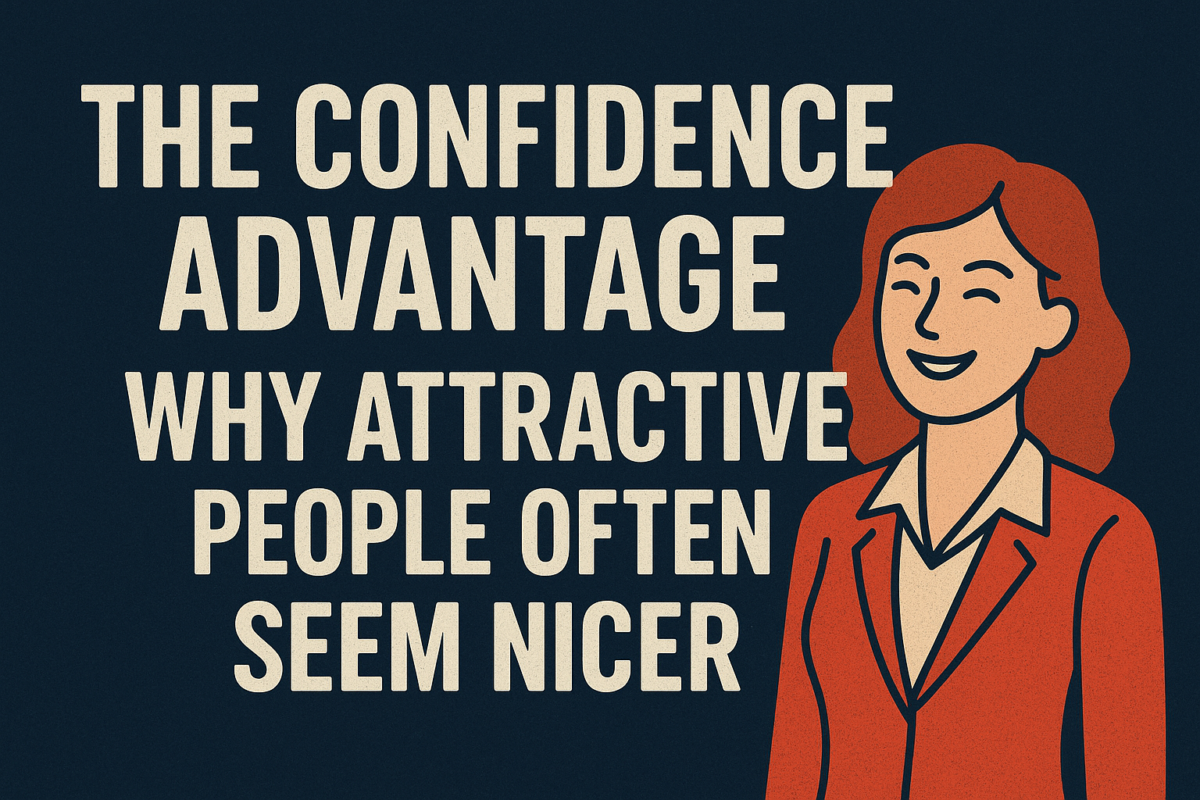There’s an observation that makes people uncomfortable to acknowledge: attractive people are often genuinely nicer to interact with. Not universally, of course—plenty of beautiful people are insufferable, and plenty of average-looking people radiate warmth. But the correlation exists enough to be noticeable.The knee-jerk reaction is to dismiss this as bias—we only *perceive* attractive people as nicer because we’re predisposed to like them. And while that’s partially true, it misses a deeper mechanism at work: attractive people often develop personality traits that make them objectively more pleasant to be around, and the engine driving this is self-esteem.
The Self-Esteem Feedback Loop
Attractive people typically receive positive social feedback from an early age. They’re smiled at more. People are more patient with them. They’re given more benefit of the doubt. Teachers, peers, and strangers treat them with a subtle preferential warmth that, while unfair, is remarkably consistent.This steady stream of positive reinforcement builds something powerful: genuine self-confidence. And self-confidence is the foundation of many behaviors we interpret as “niceness.”
When you feel secure in yourself, you can be generous with others.
You’re not constantly defending your ego or jockeying for position. You can compliment someone without feeling diminished. You can celebrate another person’s success without experiencing it as your failure. You have enough internal abundance to extend kindness without expecting something in return.
When you’re not worried about rejection, you can be warmer.
Making eye contact, smiling at strangers, engaging in small talk—these social lubricants come more naturally when you’re accustomed to positive responses. Attractive people often develop an ease in social situations because their past experience tells them that reaching out usually goes well.
When you feel valued, you’re less defensive. Much of what reads as “mean” or “cold” is actually defensiveness—people protecting themselves from anticipated hurt or dismissal. When you’ve spent your life receiving signals that you’re welcome and valued, you develop less of this protective armor. You can be more open, more vulnerable, more genuinely curious about others because you’re not in constant protection mode.
The Skills That Develop
Beyond raw confidence, attractive people often develop specific social skills earlier and more thoroughly simply because they get more practice.They’re engaged in conversation more frequently, so they become better conversationalists. They’re invited to more social events, so they learn social navigation. People are more forgiving of their early social mistakes, giving them space to develop emotional intelligence without being harshly penalized for missteps.This creates a compounding advantage. The person who develops strong social skills early becomes even more pleasant to be around, which generates more positive interactions, which builds more confidence and skill. It’s a virtuous cycle that can make attractive people not just seem nicer, but actually become more skilled at the behaviors we associate with kindness: active listening, empathetic responses, making others feel comfortable and valued.
The Comparison Problem
Understanding this dynamic becomes clearer when you consider the alternative. People who haven’t received consistent positive social feedback often develop coping mechanisms that, while understandable, don’t read as “nice.”They might be more guarded in conversation, interpreting neutral interactions as potentially hostile. They might dominate conversations to prove their worth. They might be quicker to take offense or slower to extend trust. They might struggle with eye contact or physical warmth because past experience taught them these invitations often lead to rejection or mockery.None of this makes them bad people. But it does make them less immediately pleasant to interact with, especially in casual encounters. The defensive posture born from insecurity can manifest as coldness, arrogance, neediness, or aggression—none of which we interpret as “niceness,” even when we understand the wounds beneath.
The Exceptions and Complications
This pattern isn’t universal, and the exceptions are instructive.Some attractive people become entitled or cruel precisely because they’ve learned they can get away with it. When the world consistently gives you what you want, you might stop developing empathy or consideration. Some attractive people remain insecure despite their looks, often due to family dynamics, trauma, or being attractive in ways that don’t match their culture’s specific beauty standards.
Conversely, some people who aren’t conventionally attractive develop tremendous confidence through other sources: talent, accomplishment, strong family support, or simply a personality that doesn’t tie self-worth to appearance. These people often exhibit the same generous, open warmth that confident attractive people do.And of course, much of what we call “attractiveness” is itself a function of confidence and positive affect. The person who smiles genuinely, makes eye contact, and moves through the world with ease becomes more attractive precisely because of these behaviors. It’s not always clear which came first—the looks or the confidence.
The Uncomfortable Truth
What makes this dynamic uncomfortable is that it reveals how much of personality is circumstantial rather than essential. We want to believe that our character is self-determined, that kindness or cruelty reflects some inner moral essence. But the reality is messier: how people treat us shapes how we develop, which shapes how we treat others.The attractive person who seems effortlessly kind may not be morally superior. They may simply have had the luxury of developing personality traits unencumbered by constant social rejection or the need for defensive self-protection. Their niceness is real—but it’s also, at least partially, a privilege.This doesn’t mean we should resent attractive people for their advantages, or excuse unkind behavior in those who haven’t received the same social affirmation. But it should make us more thoughtful about judging people’s character without considering the feedback loops that shaped them.
What It Means for the Rest of Us
The good news embedded in this uncomfortable pattern is that the traits we associate with “niceness”—warmth, generosity, openness—are learnable. They flow from self-esteem, and while self-esteem is harder to build without consistent external validation, it’s not impossible.Therapy, supportive relationships, accomplishments in domains you care about, and conscious practice of confident behaviors can all contribute to the kind of secure self-worth that makes generosity possible. The attractive person’s advantage is real, but it’s not insurmountable.
Understanding this dynamic should also make us more conscious of how we treat others, especially those who don’t meet conventional beauty standards. Every interaction where we’re patient, warm, and affirming with someone contributes to their self-esteem bank. Every moment we extend the benefit of the doubt helps build the confidence that allows people to be their better selves.The pattern exists: attractive people are often nicer, and high self-esteem is the mechanism. But self-esteem isn’t destiny. It’s just a head start in a race we’re all running—the race to become secure enough in ourselves that we can afford to be genuinely kind to others.

